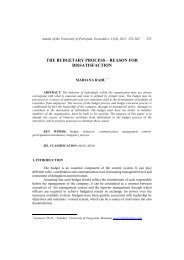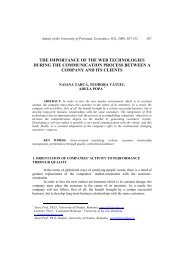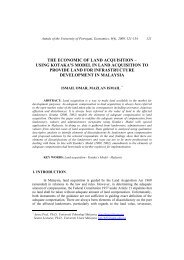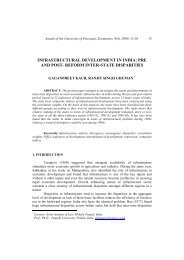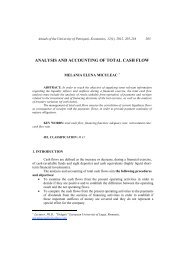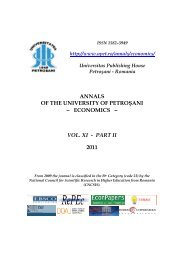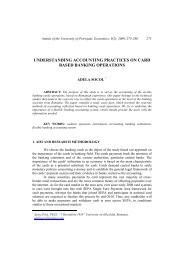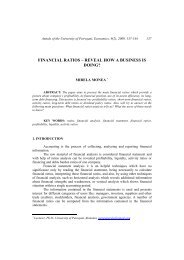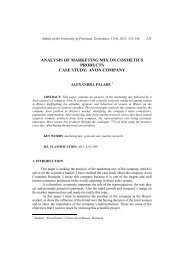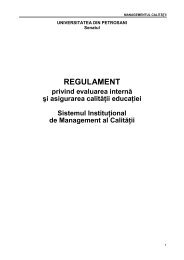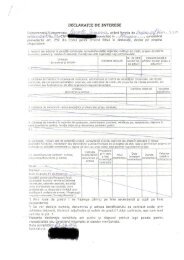FACTORS INFLUENCING MANAGERIAL COMMUNICATION
FACTORS INFLUENCING MANAGERIAL COMMUNICATION
FACTORS INFLUENCING MANAGERIAL COMMUNICATION
You also want an ePaper? Increase the reach of your titles
YUMPU automatically turns print PDFs into web optimized ePapers that Google loves.
30 Hulea, L.<br />
An object belonging to the external environment is identified according to the<br />
previous experience and to language. This fact leads to the conclusion that<br />
environment is mainly organized and mentally divided according to resembling<br />
features and less according to different characteristics.<br />
The idea largely explains language’s restrictive capacity as well as the<br />
impossibility of the complete use of any language. Further, the relativity of reporting<br />
language to surrounding reality can explain the conventional character of any<br />
communication, including business communication.<br />
Environment includes all linguistic, social, economic, cultural, and ethnical<br />
factors that have an influence upon the development and the evolution of an individual.<br />
The part played by the environment is quite complex, yet, most often, underestimated.<br />
Environment factors play different parts and might have a dominant or less important<br />
influence determining the orientation of individual behavior towards a certain<br />
objective.<br />
Beliefs or convictions exhibit an important resistance to change. Environment<br />
factors determine an important resistance to change. Environment factors determine a<br />
process of permanent learning that implies the modification of human behavior<br />
according to experience. Subsequently, a formal system is acquired generally having as<br />
a basis religious beliefs; such a system determines a certain behavior as well as a series<br />
of social barriers. Often the individual can be in contradiction with his/her environment<br />
or with himself/herself due to the fact that social barriers prevent the free expression of<br />
an individual.<br />
It was Noam Chomsky that employed for the first time the term “competence”<br />
in order to designate the capacity of a speaker to produce and understand numberless<br />
enunciations (verbal messages). In order to communicate it is necessary to easily<br />
handle language or languages - and business communication does not depart from such<br />
a rule - with a view, under certain circumstances, of getting the interlocutor’s<br />
maximum reaction.<br />
This is what one usually calls communication competence. It includes a series<br />
of rules regarding the identification and use of the most adequate words within a<br />
certain context, and the capacity of transmitting a message that would not determine<br />
the adverse reactions of the receiver. Communication competence permanently<br />
changes according to individual experience. In other words, an individual is going to<br />
display a mixture of communication competences as a result of his/her contact with<br />
various communities.<br />
The capacity of an individual to communicate is largely the result of external<br />
environment. The two key elements of the process of communication, namely the<br />
emitter and the receiver, are constantly influenced by a series of well-determined<br />
environments: educational, economic, demographic, political, legislative, cultural,<br />
religious, institutional, ecological, technological, and social. The tremendous<br />
development of the technological environment during the last decades has determined<br />
new communication ways that facilitate the exchange of ideas among individuals.<br />
Motivation appears before a message is sent under the influence of external<br />
stimuli. It is exactly the reason of communication. At a human level, the complexity of<br />
cognitive structures determines, as a result of learning processes, the existence of



